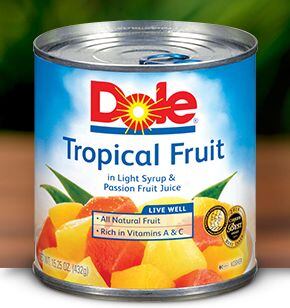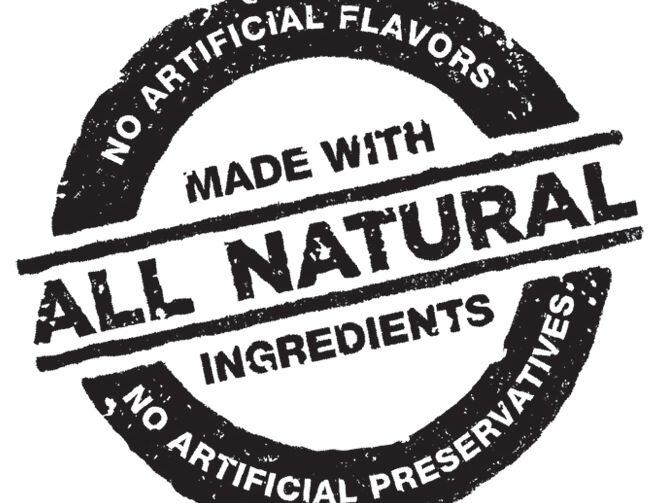Plaintiff Chad Brazil alleged that selected Dole products (in cans, cups and pouches) featuring the phrase ‘all natural fruit,’ and 'all natural fruit and juice,' would deceive reasonable consumers given that they also contained ‘synthetic’ ingredients including ascorbic acid (vitamin C) and citric acid.
While both substances are found naturally in citrus fruits, they are typically produced on a commercial scale from corn or other materials using multi-step chemical or microbial processes, and added to fruit products as preservatives, claimed Brazil. He also noted that the FDA had sent warning letters to companies adding citric acid to products and making ‘all-natural’ claims.
Dole, meanwhile, argued that its ‘all natural’ labels clearly refer to the fruit, not the entire product, although it also noted that it had in any case obtained “certifications from three of its suppliers attesting that the citric and ascorbic acid [which it says is used to aid color retention] supplied to Dole are ‘natural.’”
A district court in California agreed, and the case appeared to have fizzled out in December 2014.
Appeals court: Plaintiff presented sufficient evidence that labels might be misleading

On Friday (September 30, 2016), however, the Ninth Circuit court of appeals begged to differ, arguing that the district court “incorrectly” interpreted California consumer protection laws and that Brazil had presented sufficient evidence to show that ‘all natural fruit’ might be “misleading to a reasonable consumer” and that the “synthetic citric and ascorbic acids in Dole’s products were not natural.”
While the judges affirmed most of the other decisions made by the lower court (which said the class certification and class-wide unjust enrichment claims didn’t stand up), it said Brazil would be allowed to “pursue injunctive relief [eg. try to force a label change] on behalf of the class and his remaining claim for restitution.”

"In this climate of increased scrutiny over where food comes from and what consumers are putting in their bodies, the wave of “natural” label litigation is far from over.
"However, the opinion makes clear that the 9th Circuit will continue adhering to the Comcast principle requiring Plaintiffs to explain how damages may be calculated with common proof [Comcast Corp. v. Behrend, which held that there can be no class where a plaintiff does not show there is a way to calculate damages on a class-wide basis].
"This should provide reassurance to class action defendants."
Ryan Kaiser, chair, class action and business litigation team, Amin Talati Upadhye
Ruling could embolden the plaintiff’s bar
So what do defense attorneys make of the ruling?
Ryan Kaiser, chair, class action and business litigation team, Amin Talati Upadhye, told FoodNavigator-USA that the ruling could have broad ramifications given that "a number of suits over 'natural' label claims against food manufacturers have been stayed pending the Ninth Circuit’s decision in this and other food labeling cases."
He added: "Allowing Brazil’s claims to proceed to a jury may resume currently stayed cases, and possibly embolden the plaintiff’s bar to continue pursuing 'natural' label cases... In this climate of increased scrutiny over where food comes from and what consumers are putting in their bodies, the wave of “natural” label litigation is far from over.
"Whether the decision is right or wrong, one has to question whether the value of using 'natural' or 'all natural' on a label really justifies the business risks. Did Dole really sell any more fruit as a result of saying 'all natural'?"

"My take is that the ruling ought to embolden food companies to stop making false 'natural' claims to cheat consumers as well as their honest competitors."
Stephen Gardner, head of the food law practice, Stanley Law Group, Dallas, Texas
Attorney: Aspects of ruling are 'extremely disappointing'
Dale J. Giali, a partner at law firm Mayer Brown, told FoodNavigator-USA that it was "disappointing" that "another lawyer-driven, shake-down class action lawsuit has been reinstated by the Ninth Circuit (albeit solely on injunctive relief)."
He added: "Plaintiff Brazil was required to come forward with evidence that as to the word 'natural' on this product a significant portion of consumers would be deceived. He didn’t do that at the trial level. For the Ninth Circuit to give plaintiff Brazil a free pass on that obligation merely because an informal FDA policy exists—a policy that consumers do not know about and don’t rely on - is extremely disappointing."
(In 1993, the FDA said that it "considers use of the term ‘natural’ on a food label to be truthful and non-misleading when nothing artificial or synthetic…has been included in, or has been added to, a food that would not normally be expected to be in the food.” [58 Federal Register 2302, 2407, Jan 6, 1993].)

"Dole demonstrated on summary judgment that the plaintiff had no evidence whatsoever that consumers believe citric and ascorbic acid are not expected to be in a food labeled as natural..."
Dale J. Giali, partner, Mayer Brown
Said Giali: "The Ninth Circuit appears to go out of its way to try to neutralize the phrase, 'that would not normally be expected to be in the food.' Many food company defendants have used that part of FDA’s definition to show that a food with some synthetic ingredients is not even a violation of FDA’s policy, let alone deceptive to consumers.
"Dole demonstrated on summary judgment that plaintiff Brazil had no evidence whatsoever that consumers believe citric and ascorbic acid are not expected in a food labeled as natural. Again, the Ninth Circuit gave plaintiff Brazil a free pass on that by down-playing that aspect of FDA’s informal policy."
However, the appeals court "made a terrific set of rulings" in all other aspects, said Giali, in that it affirmed the district court’s dismissal of this strict liability theory, affirmed dismissal of the unjust enrichment claim on a class basis, and affirmed the decertification of a damages class because of plaintiff’s failure to explain how he would be able to calculate a price premium (the incremental increase in price attributable to the challenged labeling statement) with proof common to the class.
Dole Foods declined to comment on the ruling.

"All told, it is difficult to pinpoint the impact of the Ninth Circuit’s decision. Because it is unpublished, it will not bind district courts. However, its rulings on the reasonable consumer and class certification could be significant.
"On the negative side, the court’s reliance on informal agency documents to set the parameter of what a reasonable consumer would think invites a great deal of mischief by plaintiffs and sympathetic courts wishing to rule their way.
"Conversely, the court’s strict class-certification holding might make other plaintiffs’ attorneys less likely to bring class-action suits if they will face a similarly uphill battle for certification."
Washington Legal Foundation (click HERE for more analysis from the WLF)

